-
PARIS MOVIE JOURNAL (Oct.-Nov. 2016)
Paris Movie Journal (Oct.-Nov. 2016)
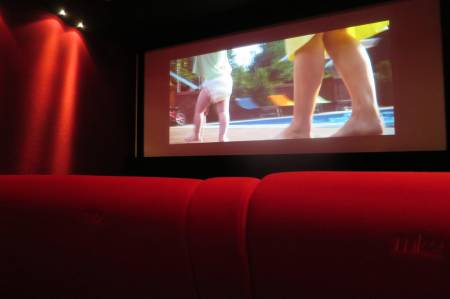
Link index to PARIS MOVIE JOURNAL reviews:
Le ciel attendra (Marie-Castille Mention-Schaar 2016)
Fille inconnue, La/The Unknown Girl (Luc, Jean-Pierre Dardennes 2016)
Le fils de Jean (Phlippe Lioret 2016)
Frantz (François Ozon 2016)
Girl on the Train, The (Tate Taylor 2016)
Handmaiden/Mademoiselle (Park Chan-wook 2016)
I, Daniel Blake (Ken Loach 2016)
Juste la fin du monde/It's Only the End of the World (Xavier Dolan 2016)
Ma vie de courgette/My Life As a Courgette (Claude Barras 2016)
Mal de pierres/From the Land of the Moon (Nicole Garcia 2016)
On revient de loin (Pierre Carles, Nina Faure 2016)
L'Odyssée (Jérôme Salle 2016)
Poesia sin fin (Alejandro Jodorowsky 2016)
Réparer les vivants/Mend the Living (Katell Quillévéré 2016)
Toni Erdmann (Maren Ade 2016)
================================================== =======================================
XAVIER DOLAN: IT'S ONLY THE END OF THE WORLD (2016)

CASSEL, COTILLARD, ULLIEL, SEYDOUX AND BAYE IN JUSTE LA FIN DU MONDE
Just the end of our patience with Xavier Dolan
He's 26 and this is his sixth feature, and the Québécois wunderkind still loves more than anything making movies about relatives yelling at each other, never more annoyingly than here. It started with the not-too-subtly titled I Killed My Mother/J'ai tué ma mère, which appeared to have strong autobiographical elements - though he didn't kill his mother, nor did the character in the movie, for that matter. His greatest success, and no less intense, a difficult watch, was the movie before this, the 2014 cell-phone-formatted Mommy, about working-class French-Canadian mom and her struggle with her bratty, psychologically challenged young son.
Dolan has said he feels this is his first work as an adult. That may mean that it's not autobiographical, he didn't write it, and it's not French Canadian. You could call this August, Osage Country for French people, except that it has very little plot. At least it's only an hour and a half, not three hours, but it still goes on far too long. It's adapted from a play by Jean-Luc Lagarce, who died of AIDS in 1995. It's about a successful playwright who comes back to see his family for the first time in twelve years, in his mid-thirties, planning to tell them he's dying. But he doesn't, and AIDS isn't mentioned.
This time Dolan used his growing clout to film in France with an all-star team, perhaps picked as much for their fame as their appropriateness to the play. They are Gaspard Ulliel, Nathalie Baye, Léa Seydoux, Vincent Cassel, and Marion Cotillard. You won't like the characters they play, and you will pity Gaspard Ulliel's meek, semi-mute protagonist, Louis-Jean Knipper, the sick, returning playwright.
Dolan has precocious cinematic gifts, and the ability to get involved in every aspect of a production, including costumes and decor, a gift for the visual. That could have a down side: that he also likes to craft the film down to the actors, allowing them too little freedom to improvise and breathe. You feel that right away because of how the ladies are made up and coiffed to look their worst and least like themselves. Cassel is even more grotesquely obnoxious than he was in My King last year. He's Antoine, Louis-Jean's brittle, insecure older brother, who is repetitious and nasty. Ulliel is meek and polite. It's not that he looks so terribly unwell - just that he's less terrific-looking and chic than usual. One would like to hear more from Louis-Jean, because he's the only nice person on screen. But one is puzzled by his tendency to be a doormat, since he's stayed away from these loser relatives so long for a good reason. He wants to make peace with his past. But it's a useless project. They're too busy squabbling and being self-absorbed to react to him.
Huge control is shown not only in the odd coiffures of the femmes, but in the up-tight camerawork, which a lot of the time doesn't allow us to see the cast below the neck. The film has a stylish look, is handsomely photographed, and neatly edited in coordination with calculatingly intrusive music. All this just makes you feel as just as brutalized as poor Louis-Jean.
It's Just the End of the World/Juste la fin du monde, 95 mins., debuted at Cannes May 2016, winning the Grand Prix and Prize of the Ecumenical Jury (and later the Best Actor César for Ulliel); a dozen other festivals, released theatrically in France 21 Sept. 2016, it has done relatively well with local critics (AlloCiné press rating 3.3, marred by some strong dissenters who find this simply an irritating, claustrophobic psychodrama), but few English-speaking critics, perhaps rightly this time, have had anything good to say (other than Peter Bradshaw of the Guardian; the Metacritic rating is a miserable 48%, and a word frequently used for the film is "inert."
Last edited by Chris Knipp; 01-22-2022 at 02:48 PM.
-
NICOLE GARCIA: MAL DE PIERES/FROM THE LAND OF THE MOON
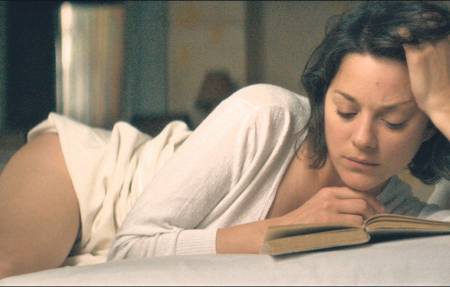
MARION COTILLARD IN MAL DE PIERRES
Magic Mountains
"Gabrielle (Marion Cotillard) comes from a small village in the South of France, at a time when her dream of true love is considered scandalous, and even a sign of insanity. Her parents marry her to José (Alex Brendemühl), an honest and loving Spanish farm worker who they think will make a respectable woman of her. Despite José's devotion to her, Gabrielle vows that she will never love José and lives like a prisoner bound by the constraints of conventional post-World War II society until the day she is sent away to a cure in the Alps to heal her kidney stones. There she meets André Sauvage (Louis Garrel), a dashing injured veteran of the Indochinese War, who rekindles the passion buried inside her. She promises they will run away together, and André seems to share her desire. Will anyone dare rob her of her right to follow her dreams?"
That's an IMDb plot summary for this new film by Nicole Garcia, which opened in France today, 12 Oct. 2016. It's nice to see Marion Cotillard looking beautiful and being full-on passionate again after her unflattering role in Xavier Dolan's tiresome It's Only the End of the World. It's also enjoyable the way Nicole Garcia likes to take us for a wild ride, as she did in her pleasingly mysterious - and more contained and interesting - 2013 Un beau dimanche/Going Away. And this is terribly romantic. Having Marion Cotillard and Louis Garrel fall in love in a Swiss sanatorium provides an exotic new dose of French movie glamor.
Adapted by the bestselling Strega-prize wining novella by the Sardinian writer Milena Agus, this is like Nicolas Sparks in French, on acid. It transfers events from Italy to France, and considerably simplifies the plot. Set in the post-war period, it focuses on an eccentric, strong-willed and sensuous woman who's put in an arranged marriage with a Spanish man when she's over thirty. Both swear they will never love each other. The husband is allowed to see prostitutes but his wife Gabrielle starts taking the prostitute's role to save them money. They try to have a child but her painful kidney stones cause repeated miscarriages. Her husband sends her to the cure in the mountains so she can have a baby, and she does. You think you know exactly where things are going, because there is a frame tale, and a very long flashback, so we know what's up with Gabrielle in the present, so when we see her finally meet Louis Garrel's dreamily ill French army officer back from Vietnam at the mountain water cure resort, and he plays Tchaikovsky's "Barcarole" so beautifully on the piano, we think we know what's going to happen.
The plot pitches us a couple of curves that feel unconvincing. The movie explanation is less convincing than the novella's, and and also winds up confusing the ongoing issue of whether Gabrielle is crazy or not. Once we get to the mountains, there are some very nice scenes and the watered-down "Magic Mountain" sequences are engaging. Cotillard and Garrel and even the underappreciated Brendemühl get to do some nice work - that doesn't, however, quite work.
A lot of the early stuff is unnecessary. It should not take so long to show Gabrielle is unhappily married, and is looking for a great love. In all the establishing scenes one feels one is being force-fed; in the mountain "cure" ones, that one is being offered a cartload of sweet pastries. Screen International calls this "an old-fashioned romantic weepie," but it pitches too many curves to provide that kind of simple satisfaction.
at Cannes May 2016, four other festivals; French theatrical release 19 Oct. 2016. Again a film well received by French critics (AlloCine press rating 3.6) that English critics have little use for (Metacritic score 42%). Screened for this review at UGC Odéon Paris on 19 Oct. 2016.
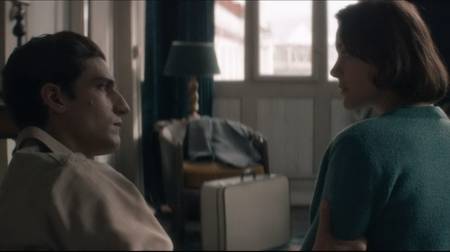
LOUIS GARREL AND MARION COTILLARD IN MAL DE PIERRES
Last edited by Chris Knipp; 02-17-2017 at 03:41 PM.
-
FRANÇOIS OZON: FRANTZ (2016)
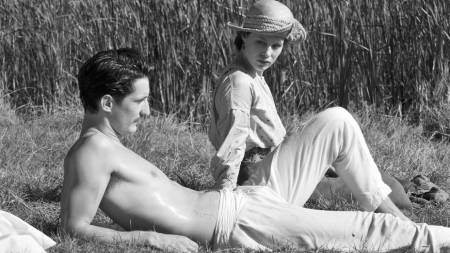
PIERRE NINEY AND PAULA BEER IN FRANTZ
Ozon redoes the postwar romance in fine style
Ozon's new Frantz at times seems terminally tasteful and tame, impeccably set in post WWI trappings and filmed in handsome black and white (with discreet color segments) that makes everything and everyone look pleasingly generic. Primarily it's a nice vehicle for its two young protagonists, the rising French star Pierre Niney (ex-Comédie Française and the official film YSL) and the promising German newcomer (so awarded at Venice) Paula Beer. Niney plays Adrien Rivoire, the mysterious slim young Frenchman who appears in the little German town cemetery where Anna (Beer) pays daily homage at the grave of her late fiance, Frantz Hoffmeister (Anton von Lucke), killed in the war.
As is his wont Ozon teases and puzzles us. And yet still he lays out points with absolute clarity. When Adrien explains who he is, it takes a while for Frantz's father, Doktor Hoffmeister (Ernst Stötzner) to accept him. But then everybody does. Later comes a shocking surprise that amateur script-doctors may have guessed; and concealment goes on, while the impact of the surprise is muted, some are protected from it, and it's then viewed from various angles.
If nothing gathers intense emotional power, Frantz touches on various intriguing themes. First is the pacifist one. A beer-drinking gang of bereaved German fathers are made to consider that they caused the war and sent their sons off to die in it. Frantz's favorite poet was Verlaine and French was his and Anna's secret language and she is fluent in French as Adrien is in German. But nationalism can't be banished with cultural affinities and a few pious generalizations. One is somewhat in the territory of Vercors' Le silence de la mer, the subject of Jean-Pierre Melville's first film, about the German Occupation officer who just loves everything French; but whose delusions become painful, while all along his humble French "hosts" refuse to ever utter a word to him.
In his Venice review for Variety Jay Weissberg points out that in Frantz Ozon is remaking Ernst Lubitsch’s anti-war drama Broken Lullaby, "expanding the melodrama while soft-pedaling the pacifism." More than that Ozon may see the pacifism as a mere teaser, or a red herring. With these two attractive people (Niney and Beer) drawn (impossibly?) to each other, there is much material for melodrama. But Ozon is having most fun with deception, surprise, and mysterious portents, including multiple hints (with reference to a painting in the Louvre by Manet) of the possibility, or temptation, of suicide. Frantz isn't as clever, sensuous, and certainly not as eccentric and provocative as some of Ozon's previous films. But in a world of kitsch excess, it does stand out. It is an elegant and beautifully made movie. In Hollywood Reporter Boyd van Hoeij saw the French:/German mirroring effects as signs of "a master storyteller."
Fratnz, 113 mins., in German and French, debuted at Venice, where Paula Beer won the Best Young Actress award. Nine other festivals including Busan, Telluride, Toronto, and London. French theatrical release 7 Sept. 2016 (AlloCiné press rating 3.7/33). The anglophone critics' rating is a bit more lukewarm (Metacritic 63). The film is also included in the Rendez-Vous with French Cinema 2 Mar. 2017(with Ozon) and 11 Mar., and its US theatrical release is 15 Mar., Bay Area 24 Mar.
For the full plot, see Wikipedia.
Last edited by Chris Knipp; 10-02-2018 at 11:51 AM.
-
MAREN ADE: TONI ERDMANN (2016)
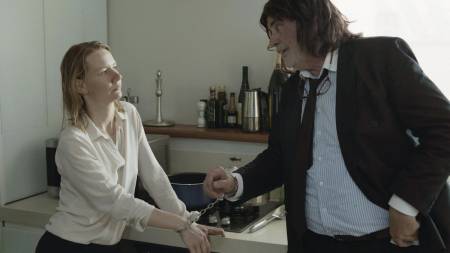
SANDRA HÜLLER AND PETER SIMONISCHEK IN TONI ERDMANN
Maren Ade's festive comedy
In Maren Ade's Toni Erdmann, which is more special and original than it may seem, a goofy, slightly over-the-hill father teaches his ultra-serious corporate daughter some lessons about life. In two words, he teaches her to lighten up. The film is rambling, and may seem overlong. It may indeed contain some unnecessary longeurs. But it needs to be this way. It's teaching viewers about the kind of patience and alertness in life's most boring times, leading to transcendence, that David Foster Wallace talks about in his famous 2005 Kenyon College commencement address titled "This is Water." And the film builds and builds, slowly. There needs to be moment when you think it's just tedious and pointless. Because Ade avoids making her "points" (except that it's a simplification to denote them so) in any obvious way.
Reports of this film came from Cannes, where it was the European critics' favorite and thought a contender for the top Competition prize, but it didn't get that. It's not a movie everyone will like. Mike D'Angelo, whose Cannes reports I've been following since his arresting "Open Letter to Lars von Trier" from the festival in 2009, loved Tony Erdmann and reported it had gotten unusual spontaneous applause (as had Holy Motors and a few others in his Cannes years) because it has a number of "glorious moments" that are "designed to blindside you," and are "in keeping with the first character we meet, Winfried Conradi (Peter Simonischek)." Simonischek is a big, shambling man with a shaggy-dog mop of grey hair, which is important)." He's the father, a devotee of practical jokes (think Lord of Misrule). When his beloved dog Willy dies, he takes a long vacation from his job as a schoolteacher. We've seen him there leading a celebratory song where he and all the students are wearing fright mask makeup, with ugly fake teeth.
Winfried doesn't take off the makeup for a while. He decides to pay a surprise visit to his daughter Ines (Sandra Hüller, wiry, tough, and fearless), in Bucharest, where she's currently working. At first he really annoys Ines. His jokes are invasive and out of place, though there's something touching and sweet about him, and them. Gradually his behavior gets through to Ines, in a good way. Ines has a key position - she lives in a large, glamorous apartment and is her boss's most important staff member, but she must also always struggle against male chauvinism in the business world, working twice as hard. A key aspect of Ade's film is that she, like Winfried, is viewed with kindness and understanding. She is heroic and tireless, going from dealings with staff to a big presentation, juggling shifts from English to German, supplely always seeming to agree with criticisms to maintain the upper hand.
Ines' heroism shows particularly in how she handles her father, especially when she tells him he must go (not just a woman executive's reaction: anyone would be upset by a father like this) and he says goodbye - then reappears in a fright wing with the fake teeth calling himself "Toni Erdmann," and saying he's a "life coach." Indeed Ines has one, whom she consults with via Skype, but Toni Erdmann's sense of the title is broader than how to win at business; it's really how to live. So anyway Ines remains patient with him. His imposture is too outrageous to expose to associates and colleagues; it would be too embarrassing; but she also shows remarkable forbearance and discipline in managing to fit him in. And as she does this, gradually his touching excesses of humor (and they are excesses: he has little control over them) show her how much she's been destroyed by an excess of the seriousness and self-discipline she's marshaled to perform her demanding job; that it's not worth it. That she's become cold and unkind, soulless.
None of this is spelled out, though. It's embodied in a long succession of bizarre incidents interwoven with the fractured details of Ines' high-pressure, accomplished, unfun life, incidents in which her father shows her how good will and human kindness, the willingness to do good spontaneously, to act outside a plan, are missing from her life.
Partly the film is the story of two dysfunctional personalities who bring out each other's rehabilitation by expressing the love they feel for each other. In fact, for a while as sometimes Ines out-crazies her father, D'Angelo notes father and daughter's "relationship grows ever more dysfunctional, even as it seems likely that 'Toni' is the only thing keeping Ines from throwing herself out the window of her high-rise apartment." We get a full view of Ines' life as it now is, but also a full view of its life-affirming disruption. The lesson the meandering, enlightening action teaches is like the rediscovery of the natural and the wild spirits in man embodied in ancient ritual and revived in what C.L. Barber desceribed as "Shakespeare's Festive Comedy." It's not a "magical cure" for all Winfried's "daughter's unhappiness," as D''Angelo notes. But it's a statement, through very particular events, off a general set of valences in the world, and how the spirit of play and ability to laugh are essential to us. It recognizes that the clowns are not the real lunatics.
The strength of Toni Erdmann lies in how it uses humble material, crude humor, and an almost real-time progression of incidents, to deliver something that could be corny in a subtle, natural way. This is even like an Adam Sandler movie, specifically his That's My Boy, D'Angelo notes "a few wags" saying. And yet it's nothing like. It's perhaps like a bizarre home video. The combination didn't win the big prizes at Cannes, but did win the FIPRESCI Prize there, and other awards elsewhere.
Tony Erdmann, in German and English, 162 mins., debuted at Cannes in Competition (FIPRESCI Prize); over two dozen other international festivals including Telluride, Toronto, New York, London, and Mill Valley. Screened 20 Oct. 2016 at the Saint-André-des-Arts II cinema 12 rue Git le Coeur, Paris. It opened 17 Aug. in France; still showing at 8 cinemas in Paris. French critical response ecstatic (AlloCiné press rating 4.3, 86%, based on 32 reviews); the Anglophone critics' response this time is similar: Metacritic score 94%.
Last edited by Chris Knipp; 11-26-2023 at 12:07 AM.
-
LUC, JEAN-PIERRE DARDENNES: THE UNKNOWN GIRL/LA FILLE INCONNUE (2016)
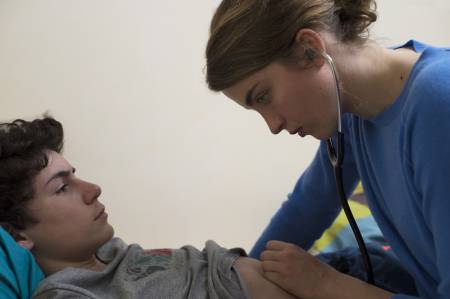
LOUKA MINNELLA AND ADÈLE HEENEL IN THE UNKNOWN GIRL
Another dogged pursuit, harder to care about
The Belgian directors Luc and Jean-Pierre Dardenne are masters of about moral awakenings and obsessive pursuits of a task. Here is another one of those, if more of the latter than of the former.
In La promesse, which put them on the map, it was a teenage son (the start for the great Jérémie Renier) in defiance of his mean father (the equally great Olivier Gourmet) keeping a pledge to do right by an abused immigrant. In Rosetta, a teenage girl (Émilie Dequenne) is in desperate, tireless pursuit of a decent job to escape her alcoholic mother. In The Son/L'Enfant, a carpentry teacher (Gourmet again) pursues the boy who killed his son, with ambivalent motive but a final moving shift toward forgiveness. In The Child (Renier again) a young man seeks to sell his own baby, but comes to see the wrong of this desperate and ignorant act. Lorna's Silence is far more complicated, but involves the protagonist's desperate struggle to open her own business The Kid with the Bike, starring another young discovery, young firecracker Thomas Doret, with the luminous Cécile de France, follows a boy's desperate (and useless) effort to reunite with his father (Renier, grown up now), who has abandoned him.
The Dardennes used a big star, Marion Cotillard, for Two Days, One Night, typically about a desperate pursuit during the allotted time in the title to persuade a group of coworkers to vote against a bonus so she can be allowed back to work after a nervous breakdown. It's a dogged, exhausting story, but an actress as good and as appealing as Cotillard and a suspenseful plot, it holds our attention till the last.
The Unknown Girl/La fille inconnue is typical Dardennes material. But both because of the theme and the lead actress, despite attentive craftsmanship to every scene, the whole film feels less involving or moving. It's about young Liège general practitioner Jenny Davin Adèle Haenel), who attempts to uncover the identity of a would-be patient who has died after she has ignored her desperate effort to be admitted after hours. This is a task not involving moral development so much as perhaps an act of penance, and relief of a guilty conscience. Adèle Haenel has shone in dry, feisty roles, and that aspect is tamped down here, but she lives up to expectations: convincing as the businesslike young doctor, she is relatable, if not adorable, and Jenny achieves her goal. She has the necessary convincing dedication and tireless intensity. But as written, the character does not significantly change.
The story is neatly told; one scene rapidly follows another. And yet, since Jenny is juggling doctoring with crime investigating, the narrative proceeds unevenly. Sometimes it's hard to see if she is doing her job as a doctor, or pretending to as an excuse to contact various people and press them for details of the unidentified woman, showing her photo on her smart phone. The latter was African, a prostitute, connected with drug dealers, and so Jenny winds up sticking her nose into places where she isn't welcome. The film starts to seem like a police procedural conducted ay an amateur - without the suspense such tales normally involve. The cops even approach Jenny at one point to tell her she's marring their process by spooking potential sources. And then there is the case of Julien (newcomer Olivier Bonnaud), an intern working with Jenny whom she pursues with equal doggedness after a child having an epileptic fit apparently shocks him so much he decides to give up training in medicine. She even goes to see him out home in the country to have a heart-to-heart talk. It apparently succeeds, she learns from a phone call. However involving, this story seems tacked on. As has happened sometimes before, this is an unmistakable Dardennes film, but not one that shakes you to the core as the best ones do.
The Unknown Girl/La fille inconnue, 113 mins., debuted at Cannes in competition May 2016; 13 other festivals; French theatrical release 12 Oct. 2016, also included in the main slate of the New York Film Festival; US premiere that day. French critical response mild (AlloCiné press rating 3.2/30). Screened 21 Oct. 2016 at MK2 Odéon, Paris.
Last edited by Chris Knipp; 10-23-2016 at 12:59 PM.
-
PHILIPPE LIORET: LE FILS DE JEAN/JEAN'S SON (2016)
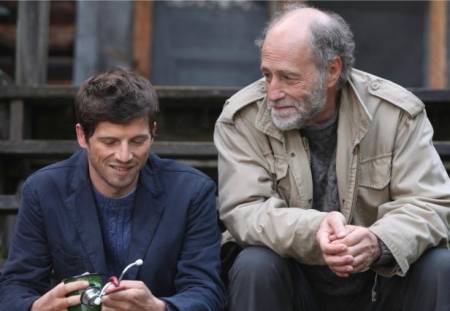
PIERRE DELADONCHAMPS AND GABRIEL ARCAND IN LE FILS DE JEAN
Detective work on oneself, in Canada
Thirty-five year-old Parisian divorcee Matthieu (Pierre Deladonchamps, of Stranger by the Lake, who has the charming, weary smile of Patrick Bruel) has a six-year-old son he sees on weekends. Dedication to a demanding job in business keeps him (we later learn) from his true love, writing crime novels; he's written only one, but it was quite successful. One day he gets a phone message from Quebec that his father, whom he's never known, in fact didn't know was alive, has died, and left him a package. His father was Jewish (he didn't know that either) and the internment will be in a couple days. He flies to Montreal, and the film focuses on the few days of Matthieu's sojourn in Canada and its surprises and revelations. Lioret works quietly, subtly to unfold a tale built of many small details, a search for personal identity and fatherhood played as a mystery story.
Matthieu is met at the airport by Pierre (Canadian stage vet Gabriel Arcand, brother of Denys), his late father's longtime doctor friend, who at first, for a while actually, isn't very friendly. Matthieu isn't interested in the internment, only in meeting the two brothers he's just found out about. Pierre agrees only if Matthieu doesn't reveal who he is.
It also turns out the father died while fishing on a lake, probably of a heart attack, and his body has not been recovered. The two brothers (Pierre-Yves Cardinal, who's worked with Xavier Dolan; and Partick Hivon), decide to search again on the lake, and Matthieu gets involved, pretending to be a friend on vacatio. Pierre goes too, to prevent revelations. There's nonetheless a violent drunken quarrel between the brothers that reveals misunderstandings about inheritance. Later Matthieu, whose identity Pierre has revealed to his own family, gets friendly with Pierre's daughter and two little granddaughters, and eventually receives another revelation from his wife.
Deladonchamps, boyish yet not young, self-contained yet pulsing with withheld emotion, with those big lips and open eyes, is a compelling presence. Arcand has quiet authority, and can go from brusque and unkind to reaching out and concerned in the blink of an eye. Whether the action seems to you revelatory or just corny, Deladonchamps and Arcand are fun to watch together, or apart (Deladonchamps has scenes with other people), and Lioret obviously knows this. And the Quebecois world provides a fascinating strangeness too that heightens the sense of the contrast, then growing rapprochement between the two men.
The outdoor sequences up on the big woodsy lake provides a nice break between the urban and interior ones; but wildness comes from one of the brothers back in Montreal later too, and Matthieu gets a bloody nose.
Lioret explored another kind of family mystery with his 2006 Don't Worry, I'm Fine, an important vehicle for Mélanie Laurent and Kad Merad as film actors. He has explained that the new scenario grew out of a novel he was long interested in, Jean-Paul Dubois' Si ce livre pouvait me rapprocher de toi ("If this Book Could Bring Me Close to You"), which [i]Cahiers du Cinéma calls "treacly," but he says he's just used its most rudimentary elements. Deladonchamps deserves to be a bigger star.
Le fils de Jean ("Jean's Son"), 98 mins., debuted Aug. 2016 at Angoulême; also Warsaw Oct.; French theatrical release 31 Aug. 2016. Well received (AlloCiné press rating 3.5/25) but not by all: Les Inrockuptibles found it preachy and sentimental; Le Monde compared the Arcand-Deladonchamps duo to Claude Sautet's films, but thought it was weakened by timidity and too much restraint, and Lioret is that way sometimes. Screened 23 Oct. 2016 at UGC Odéon, Paris.
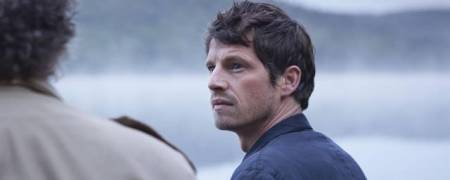
PIERRE DELADONCHAMPS IN LE FILS DE JEAN
Last edited by Chris Knipp; 10-23-2016 at 01:10 PM.
-
JÉRÔME SALLE: L'ODYSSÉE/THE ODYSSEY (2016)
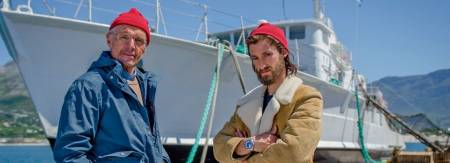
LAMBERT WILSON AND PIERRE NINEY IN L'ODYSSÉE
Shallow waters
This biopic follows the career of the famous French undersea explorer and maker of TV documentaries Jacques-Yves Cousteau. He was a pioneer who made the world of water his domain. Commander Cousteau (Lambert Wilson), depicted here with his two sons Jean-Michel (Benjamin Lavernhe) and Philippe (Pierre Niney) and his wife Simone (Audrey Tautou), was a naval officer, member of the Académie Française, scientist, innovator (most notably of the aqualung), explorer, conservationist and indefatigable public figure as well known in America and beyond as in his native France. Salle has made a grand and glorious film full of energy and hope and enlivened by big, bright, open images of sun and sea, with some breathtaking underwater photography. The cinematography by Matias Boucard is luminous, the music by Alexandre Desplat sweeping.
And yet this movie based on books by Jean-Michel and Albert Falco takes on a routine air early on and winds up being at times on the flat and disappointing side, too timid in its exploration of rough truths, too hagiographic all the rest of the time. Salle's handsome, beautifully filmed movie has a few impressive diving sequences, but not many and only a couple that are awesome. But maybe that wasn't the point. Public issues and personal problems are not ignored. The trouble is that throughout, the film seems showy and artificial. It winds up feeling like a missed opportunity: too often the ceremonial overtakes the dramatic, and overall a bit on the bland side. Salle's Odyssey is a spectacle that will delight fans of ocean photography and of Cousteau. It's just not one of the year's compelling dramatic films.
The film doesn't hesitate to depict some of Cousteau's sad, dark times and conflicts with Simone and Philippe. Tautou and Niney shine, and this is further proof that Niney has the makings of a big star, who's perhaps at his most dashing and sexy on screen yet as Philippe. Philippe's conflict with his father began when the brothers were sent off to boarding school, which he considered "abandonment." It's clear the Commander has some large blind spots and a giant ego, and loves fame as much as he loves nature. Niney provides glamor and excitement as well as eye candy (the glowing skin, the sculptured torso, the glossy locks, the steamy glances), but the clash of father and son is powerful dramatic material that the film unfortunately only touches on.
There are important historical themes here. First of all Cousteau begins diving at a time when it was all new. He and his collaborators (a crew lovingly satirized in Wes Anderson's endearing The Life Aquatic with Steve Zissou <), with the big boat The Calypso, had to develop the aqualung, to breathe underwater, and the pressure-resistant cameras they used to photography the marvels they found. And then Cousteau had to develop a career - the big American contract to make films to be shown on TV. Over the decades, we see how this innovator started to become outmoded.
The height of Cousteau's fame comes through the Palme d'Or-awarded film (based on his first book), The Silent World, co-directed with Louis Malle; and then, starting in the Sixties, for decades the "Voyages of the Calypso" TV series was standard fare in the US and elsewhere.
The film gradually reveals the extreme naivety of the Calypso crew, who ignored how they were destroying the world they were observing. Cousteau is aware of ecological issues early on, but does work for petroleum interests because he needs financing - and that's an issue from the start, when Simone sells all her jewels to buy the Calypso. Later, the Commander forgets about ecology and cheats on his wife. This behavior causes a serious rift with Philippe, who disappears for four years - and Niney is missed. But they make up.
Fabien Lemercier comments on Cineuropa.org</a> that [i]L'Odyssée "doesn’t dig too deeply, so as to preserve the audiences’ empathy for its characters." That's precisely the trouble with this beautiful, ambitious, not unrealistic but still thoroughly timid movie. Commander Cousteau dives under the waters, director Salle stays on the surface.
L'Odyssée/The Odyssey, 122 mins., debuted 23 Aug. 2016 at the Festival du Film Francophone d'Angoulême, also showing at four other festivals, and released in French Cinemas 12 Oct. by Wild Bunch. French critical response was positive but not exceptional (AlloCiné press rating 3.4). Les Inrocks, Le Figaro, Libération, Le Nouvel Observateur, and Le Monde] all published reviews expressing serious disappointment. See the lively take-down in Le Nouvel Observateur and the explication of the more complex issues in LIbération.
Last edited by Chris Knipp; 02-19-2017 at 10:06 AM.
-
MARIE-CASTILLE MENTION-SCHAAR: LE CIEL ATTENDRA/HEAVEN WILL WAIT (2016)
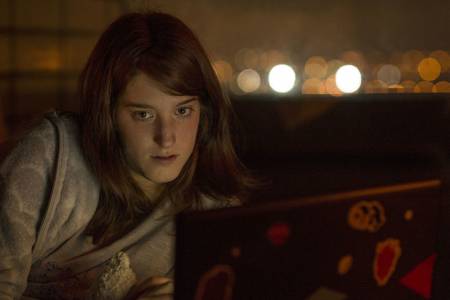
NAOMI AMARGER IN LE CIEL ATTENDRA/HEAVEN WILL WAIT
Losing daughters to radical Islam
At times borderline implausible because the behavior shown is so idiotic but no doubt true, Marie-Castille Mention-Schaar's new film Le ciel attendra ("Heaven Will Wait") describes two case studies of French girls who are recruited to go off to join Daish/ISIS (the Islamic State, الدولة الإسلامية). A sizable number of young Europeans, males as well as females, decide to become jihadists. (This doesn't consider the different motivations of boys who do it.) Fabien Lemercier points out in Cineurops that the French films La Désintégration and Inside the Cell have looked into a local cell planning an attack, and writer Thomas Bidegain's directorial debutHadewijch (NYFF 2009). Dumont approaches his subject crabwise, interestingly broadening perspective by intermixing Christianity and Islam.
The focus here is on Sonia (Noémie Merlant), who's under house arrest after having been apprehended by French police before departing for Syria. Together with her French mother and Arab father (Sandrine Bonnaire and Zinedine Soualem) she is reindoctrinated (while we are lectured) by a real-life specialist in these cases, Dounia Bouzar (directer of a "center for the prevention of Islamic-based sectarianism"). The youngster being converted whose story is inter cut with Sonia's is the timid, homely Mélanie (Naomi Amarger), who dreams of changing the world - and, gradually, of instead becoming the chaste love-child of a dashing Arab Islamist who feeds her (oral, French) messages of seduction and indoctrination via Facebook. The film goes back and forth in time, focuses in the present on Mélanie's suffering mother (Clotilde Courau) while constantly flashing back to scenes of Mélanie in her bedroom or the classroom; her "Prince" is there via handheld device in both places. (How excellent such devices seem for brainwashing or hypnosis, and how like puppets young people sometimes look walking around staring at their electronic breviaries!)
But according to the screenplay, by Emilie Frèche, it is not certain which this film is calculated to do: convey information or instill panic. It might be nice to see some films about Europeans recruited to the traditional Islam of love and peace, or Muslims who are good citizens. I noted in my review of Daniel Leconte's It's Hard Being Loved by Jerks (NYFF 2008), the Muslim population of France is the highest in Europe and makes up seven to ten percent of the total. Lately, though, the terrorist attacks that have taken place in France have made my declaration that Muslims in France are more confident there than in the US a little less convincing.
Studio Ciné Live is right when its reviewer says this film's effort to make the topic "cinegenic" turns its tory into a kind of "Jihadism for Dummies." This breathless account is not as enlightening or searching as it could be, and its undertone of hysteria is troubling, turning into another kind of indoctrination. Craziness needs to be fought with sanity. As Les Inrocks points out, the films is at its best when it points out the subtle stages by which a young mind can move from criticism of society to religious extremism. Isn't that what Bruno Dumont, in his sui generis manner, is doing much more fully and artistically in Hadewijch?
Le ciel attendra/Heaven Will Wait, 90 mins., debuted at Locarno Aug. 2016; other festivals, Angoulême, Toronto, Busan and Tokyo. Released in French theaters 5 Oct. 2016. Reviews were enthusiastic: AlloCiné press rating 3.7/28.
Last edited by Chris Knipp; 10-28-2016 at 06:17 PM.
-
KEN LOACH: I, DANIEL BLAKE (2016)
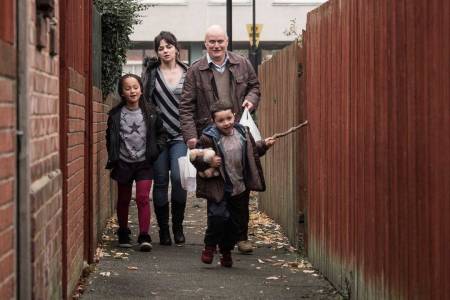
Bureaucracy grinds down
Ken Loach's Cannes Golden Palm winner I, Daniel Blake packs a powerful emotional punch using a neorealist method close to De Sica. Loach's films have become more doctrinaire since he's taken on Paul Laverty as his writer. Their theme is, that in an increasingly money-based, conservative world, as Peter Bradshaw put it in his Cannes Guardian review, "the [British] benefits system has been repurposed as the 21st-century workhouse in our age of austerity: made deliberately grim, to deter or design out all but the most deserving poor." And Loach and Laverty are pretty fucking angry about this. It's not subtle material. But with this kind of economical and plangent filmmaking, you have to be hard-hearted to resist.
Daniel Blake, the everyman exemplar, is a 59-year-old carpenter - played by the disarmingly good and honest looking standup comic Dave Johns - struggling to get public assistance while the state welfare bureaucracy's minions toy with him and ignore who he is. He has had a major heart attack and is on doctor's orders not to work for some months at the craft he has practiced all his life. Some social services "decision maker" misreads a supernumerary questionnaire he oughtn't to have undergone. Or maybe she is getting revenge on him for showing her stupidity angered him. (The first governmental voice, in the opening credits, we never even see.) His status is reversed. He's declared qualified to work, apparently because he can touch his opposite shoulder and put on a hat. Disability payments are denied. He must reapply, and in the meantime to receive funds must inappropriately seek unemployment benefits. For them, he's supposed to spend 35 hours a week seeking jobs he can't take, and prove he has done it. Already it's a Sisyphean Catch-22 situation, and it goes on and on.
Besides this Dan is old-fashioned and computer illiterate and the new system requires many procedures to be performed online. The Internet is not a benefit; it only helps the deliverers of inhumanity to complicate things for decent, deserving folk. Dan has never handled a "mouse" and thinks the "cursor" well-named. Constantly threatened with "sanctions" for not fulfilling requirements, he has to attend a weekend workshop on making a CV whose main thrust is that job seeking is hopeless and employers indifferent. His resulting CV he hand-writes with a pencil. Nonetheless he gets a job offer with it, which of course he can't take.
The best parts of the movie involve distractions from this grim struggle. A touching complication is added when, early on at the social services office, Dan meets and comforts Katie (Hayley Squires), a hard-up single mum with two little kids recently arrived from London, who become a surrogate family for the recent widower Dan. He also has human moments with his young black neighbor, an energetic footballer attempting to make a living under-selling expensive trainers he gets direct from China. Katie's situation and her kids are sad and touching. The story verges on Defoe - Moll Flanders, perhaps.
The bottom line is the solid decency and fight to maintain dignity. We are watching working class people ground down by the state into dire poverty when, with a little help, they could be making a constructive contribution to society. I did not feel here the breathtaking authenticity of Ken Loach's debut film Kes. This hasn't the complexity of the related French film, Stéphane Brizé's The Measure of a Man/La loi du marché (NYFF 2015). But this gets you more in the gut, and of Loach's late phase work (he is now eighty), I, Daniel Blake may be his best. Did it deserve the Palme D'Or? Cannes top awards are often debatable. But Loach deserves recognition for his devotion to rock-bottom social concern and his classic craftsmanship.
I, Daniel Blake, 100 mins., debuted at Cannes 2016 in Competition, receiving the Palme d'Or; also shown at 14 other international festivals, including Locarno, Toronto, New York and Vancouver. Theatrical release in many countries 21 Oct. 2016. In France 26 Oct. Screened for this review at UGC Danton, Paris 26 Oct.
Last edited by Chris Knipp; 10-28-2016 at 06:08 PM.
-
TATE TAYLOR: THE GIRL ON THE TRAIN (2016)
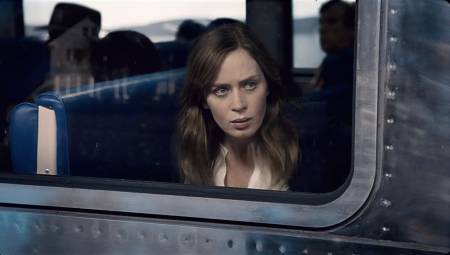
EMILY BLUNT IN THE GIRL ON THE TRAINa
Botched viewpoints
Tate Taylor's The Girl on the Train looks good and drums up excitement with lurid action and hysterical narration. In the lead as the disturbed, alcoholic Rachel it has Emily Blunt, who is hot now and after Denis Villeneuve's great Sicario last year could be considered an action star. It also has other name actors, Justin Theroux, Edgar Ramírez, and Allison Janney, who deliver smooth performances. But it provides no satisfaction beyond the surface. It was heavily promoted well in advance, in vain: it is a terrible movie. Or more accurately a movie pleasant to watch at home while half dozing, without thinking, but otherwise useless.
Why is this? The novel apparently is a matter of multiple viewpoints, an unreliable narrator (Rachel), and a complicated timeline, botched by Tate Tayor (whose direction of The Help didn't prepare him for a thriller) and creative writing professor Erin Cressida Wilson, whose screenplay adaptation for the interesting sadomasochistic study Secretary also did not prepare for complicated action narratives. Emily Blunt provides a great range of emotion, but it has no coherent context.
This is the kind of story - a disappearance, murder, adultery, alcoholism, psychotherapy - that's too overexcited and busy to create believable characters or situations, but that nonetheless if well done can satisfy our problem-solving impulse. Unfortunately, the material dished up by Taylor and Wilson from Paula Hawkins' novel provides nothing clear enough to analyse.
We get close to Rachel early on. She rides the train from the suburbs to Manhattan and back every day. Later it turns out her drinking has gotten her fired from her job over a year ago, so she is pretending to go to work from the friend's house where she is now living. What does she do all day. She "rides the train." How is that possible? The trip from Ardsley-on-Hudson to Manhattan isn't that long. What does she do? Well, she drinks in the Grand Central Station restaurant; we see that. Mainly, she admires a couple she glimpses along the way. How is that possible? Well, it turns out they're next door to where she used to live with her ex-husband, Tom Watson (Justin Theroux), now married to Anna (Rebecca Ferguson), who has a new baby and whom Rachel tends to stalk. The couple next door whom Rachel thinks idyllic are Megan (Haley Bennett) and Scott (Luke Evans).
It turns out the novel has three narrators, Rachel, Anna, and Megan. But we only hear Rachel. When we see what only Anna or Megan could know, it's as if from an omniscient narrator. It also turns out Megan is working as Anna's nanny, or at least I think so, and she quits. Then she disappears. Did Rachel kill her? Did Tom? Or Anna, since Megan and Tom were, well, "fucking"? ( In the French subtitles, most of the vulgarity was suppressed, sensibly so, since it's unnecessary from such well-off, good-looking people.)
Rachel is a mess, jobless, lonely, a longtime alcoholic, having blackouts. (Blunt delivers all that emotion but - despite the obligatory AA meeting - doesn't show the wear and tear of an advanced alcoholic, the only flaw in her performance, but a serious one.) It's supposed to be important to find out what Rachel saw. But the film's confused and annoying flashback structure lose us, and we give up caring. Those reviewers who've had something good to say about this generally condemned movie excuse it as soft entertainment that stimulates the audience's tastes for vicarious misbehavior, luxury, adultery, riding the computer train without having to work at a job, murdering without being punished. Indeed as a murder mystery this disappoints by not tying the threads at the end. It seems to be enough to show Who Done It and how violently he gets punished.
This is the story of a Very Bad Man, an insecure exploiter of women, who gets well and truly polished off. If only it were a well-told tale. The filmmakers have turned it into a very badly told one, with glossy suburban scenery, pretty women, and nice houses. Perhaps Edgar Ramírez will always seem wasted after his wonderful role in Olivier Assays' miniseries Carlos, but he certainly does here as an amorous shrink, as does Allison Janney as a suave but surprisingly incurious police detective.
Not particularly a "Paris movie" of course, The Girl on the Train, retitled in French Le fille du train, also is not to be confused with André Téchiné's 2009 The Girl on the Train, whose French title was the more specific Le fille du RER. The RER (Réseau Express Régional) actually is a commuter train, and the "girl" (not a very PC term?) played by Rachel (Emily Blunt) also is one of those, never named, the MTA Metro-North train from Manhattan to posh Westchester County, specifically to Ardsley-on-Hudson.
It has been suggested that Tate Taylor & Co. want to emulate David Fincher's lurid, lively thriller adaptation Gone Girl - and of course fail; or that Hitchcock could have made something good of this - and did: Rear Window.
La fille du train/The Girl on the Grain, 112 mins. was theatrically released in many countries in the first week of Oct. 2016, 7 Oct. in the US, 26 Oct. in France. Screened for this review at UGC Odéon 27 Oct. The Metacritic score is a well-deserved 48%; AlloCiné's press rating of 2.3/21 shows the French critics agree.
Last edited by Chris Knipp; 10-27-2016 at 05:53 PM.
-
PIERRE CARLES, NINA FAURE: ON REVIENT DE LOIN (2016)
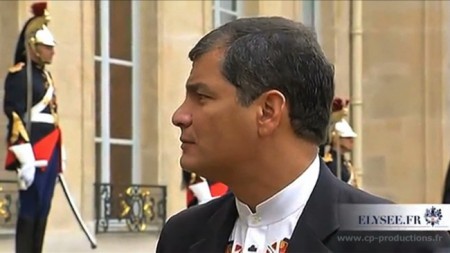
RAFAEL CORREA IN ON REVIENT DE LOIN
Tracking Rafael Correa, his followers and opposition
The full title of this French film, mostly shot in Ecuador, is On revient de loin: Opération Correa 2. It's the on-the-scene follow-up to the 2014 film Les ânes ont soif : Opération Correa 1/The donkeys are Thirsty: Operation Correa 1, in which the French documentary team covered Rafael Correa's tour of Europe and appearance at the Sorbonne, which, as they pointed out with annoyance, was studiously ignored by the mainstream French press including Le Monde diplomatique.
President of Ecuador since 2007, Correa is perhaps the most successful of the new leftist "pink tide" Latin American leaders who included Cristina Kirchner of Argentina, Hugo Chavez of Venezuela, Lula da Silva of Brazil, Evo Morales of Bolivia and himself, starting early in the millennium and giving way lately to a right wing backlash. Rejecting past West-dominated neoliberal policies, anti-austerity in economics, refusing to pay part of the public debt, reclaiming native resources from the multinationals, achieving clear improvements in health care, education, housing, and personal income, Correa has maintained high approval ratings in the country and abroad - though his populist brand of socialism not unlike that of the late Hugo Chavez of Venezuela, has not endeared him to the US.
Thanks to Correa's policy of redistribution, poverty and inequality have been sharply reduced while the middle class has doubled in size in eight years. Pierre Carles and Nina Faure and their team arrived fired up with enthusiasm in this new Eldorado, but encountered unrest and discord in the streets surrounding issues such as legalizing abortion, outlawing gas stoves in favor of induction ones, resettling indigenous people for a mining project, and instituting heavy taxation of the richest citizens - to which they listen with a sympathetic ear. On revient de loin , which is consciously self-reflective, studiously avoids hagiography and continually holds up ideas to be examined and criticized. The French review Télérama calls this a "dialectical" documentary. Libération says in its review the filmmakers "are forced to tone down their enthusiasm." The film not only closely follows views of some opponents of Correa but dramatizes the two directors' differences of point of view and sensibility. They also wind up with different conclusions, one ready to encourage Correa, who speaks French, to come to France and help run the country, the other coming to question the whole idea of a head of state who's some kind of "savior."
One can contrast this documentary, which has good access both to Correa and some of his strongest critics, both on the streets and in offices, with the drum-beating one for Hugo Chavez done by the Irish filmmakers Kim Bartley and Donnacha O'Briain, The Revolution Will Not Be Televised (2003), which I bought into a bit too enthusiastically at the time. Chavez is gone and Venezuela is in a terrible mess.
Carles and Faure, who include several direct interviews with Correa, present a less glowing overall picture. They also don't have a blatant effort by enemies to overthrow Correa to cover, which understandably may have turned the Irish filmmakers into more Chavistas than they were already.
This film points out that you can't remake Ecuador's economy overnight; that Correa's redistributions have not fundamentally changed the system. The film, which has regular Skype dialogues between the team in country and directors back home, has a rough quality, the more so with unexpected demonstrations and hastily organized trips. The provisional feel is at least partly intentional as the jury is still out, and the film, and the regime, are works in progress. The downside is that by film's end, one has heard many arguments, but has little idea how things stand.
On revient de loin: operation Correa 2/Back from Afar: Operation Correa 2, in Spanish with French subtitles and in French, debuted 26 Oct. 2016 in France. Reviewed very favorably by 7 major journals (AlloCiné 3.8). Screened for this review at Espace Saint Michel, Pairs, 26 Oct.
Last edited by Chris Knipp; 10-28-2016 at 05:59 PM.
-
ALEJANDRO JODOROWSKY: POESÍA SIN FIN (2016)
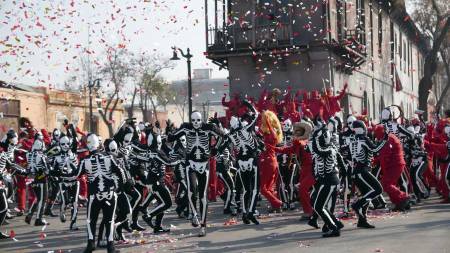
More surreal autobiography from Jodorowsky
Poesia sin fin ("Endless Poetry") is a direct continuation of Jodorowsky's surprising return to filmmaking of three years ago, La danza de la realidad. There are new and astonishing scenes and episodes, some as shocking and disturbing as the last, and the omnipresent stagehands covered in black augment the boldly fantastic mise-en-scène, but if you've seen La danza de la realidad you will feel strangely at home, because there are the same locales and main actors playing the main roles. Again Jodorowsky himself is present as a character and a commentator, handsome, dashing, and entering the second half of his eighties. Again we see the young Alejandro (Jeremias Herskovits as a child; Alejandro's son Adan Jodorowsky grown up) struggling with his domineering, petty-minded father Jaime (played by another older son, Brontis Jodorowsky). Now he is entering into youth and young manhood, and declaring - and living - his enduring passion for and dedication to poetry and poets. That is clear. Specific episodes are surreal and fantastic, and no particular effort is made to recount the actual details of Jodorowsky's early involvement with Latin American and European intellectual circles. Just go with the flow, and you'll be taken to new places.
Poesia sin fin, 128 mins., debuted at Directors Fortnight at Cannes May 2016; over a dozen other international festivals including Moscow, Munich, Jerusalem, Locarno and Vancouver. Theatrical release in France 5 Oct. The (AlloCiné press rating is a glowing 4.0/23, and Anglophone critics have been equally enthusiastic: Metacritic 84%.) Screened for this review at MK2 Odéon - (côté St-Michel), Paris,on 23 Oct. 2016.
Last edited by Chris Knipp; 10-29-2016 at 08:03 AM.
-
CLAUDE BARRAS: MA VIE DE COURGETTE/MY LIFE AS A COURGETTE (2016)
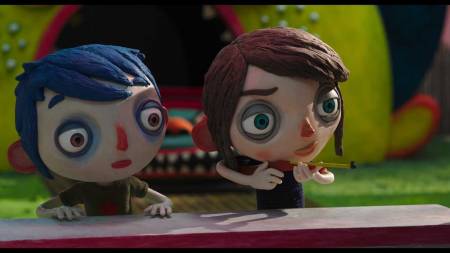
COURGETTE AND CAMILLE IN MA VIE DE COURGETTE
Tough kids
This stop-motion animated film from the Swiss director Claude Barras is about little kids, but is it for little kids? Its treatment of a group in a foster care center who've encountered hard knocks early on could build sensitivity among youngsters, but their parents might not want them to see it. It delivers a parallel and engaging message. Just as we the viewers surprise ourselves by how fond we grow of young critters who look like big-eyed rag dolls, the kids they represent, with little to go on in previous knowledge or experience of love, develop deep loyalty and affection toward each other in the film's short but emotionally intense 70-minute run time.. All this is thanks to Barras' fortunate collaboration on the writing with the 36-year-old Céline Sciamma, whose three films thus far as a writer-director, Water Lilies/Naissance des pieuvres (2007), Tomboy (2011), and Girlhood/Bande de filles (2014) has each in its different way shown a fresh, bold way of looking at the experience of youth. (Sciamma's contribution as a writer has just been seen in André Téchiné's strong new gay coming-of-ager, Being 17/Quand on a 17 ans.) Here she is adapting a novel by Gilles Paris.
Icare (Icarus, voiced by Gaspard Schlatter) is a 9-year-old who prefers his nickname "Courgette" (aubergine, zucchini). He lives with his alcoholic sigle mother, until he causes her accidental death, and he is taken by a kindly, mustachioed policeman called Raymond (Michel Vuillermoz), to the orphanage. We feel keenly the loneliness and strangeness of the first hours there, the first, sleepless, night. He is mercilessly teased by others, led by Simon (Paulin Jaccoud). Simon's rag-doll face is the most interesting. Its sharp angularity seems cruel, and then reflects vulnerability. It soon becomes clear the kids share very similar experiences of deadbeat, druggie, alcoholic and absent parents.
Barras and Sciamma don't make the foster center a harsh place. Just being there is hard enough for these lost children. Every minute there, and on a brief trip to the mountains, is a time of intense learning and change for the kids. Simon razzes Courgette and insists on calling him "Potato." When the moment comes that he uses "Courgette," it's a big coming together. Then comes the arrival of Camille, whom Courgette falls for. Again the bonding owes a lot to sharing similar, grim backgrounds. Things get more complicated when an evil aunt wants to adopt Camille, and the sweet Raymond first visits, then wants to adopt, the children.
As Boyd van Hoeij says in his Cannes review for [URLf="http://www.hollywoodreporter.com/review/my-life-as-a-courgette-891734"] Variety[/URL], given that the kids' "faces are made of plasticine, what Barras has achieved here is nothing short of a miracle." There is nothing like the complicated mise-en-scène of the Belgian stop-motion Panique au villageof Stéphane Aubier and Vincent Patar, but somehow we're immediately drawn in emotionally and it stays that way. It's almost as if the more blatantly unreal the scenes and critters are, how simple and minimal the settings, the more we identify and care. Some of the vivid, delicately particularized experience depicted here is sure to stay with you.
Ma vie de courgette/My LIfe As a Courgette, 66 mins., debuted 15 May 2016 in Directors Fortnight at Cannes; close to a dozen other festivals including Annecy and Angoulême. French theatrical release 19 Oct.: rave reviews (AlloCiné press rating 4.5 based on 30 critiques). Screened for this review at MK2 Odéon Hautefeuille 28 Oct. 2016. There were some little kids brought to the early show; I wondered how it went for them. Probably fine. They're tougher than we know; that's what the film itself is telling us. And as van Hoeij points out this is ultimately a happy movie that ends with sunshine.
Last edited by Chris Knipp; 01-02-2017 at 10:03 AM.
-
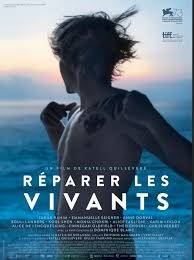
Coming next week in Paris.
Two films coming to Paris cinemas in a couple days look like must-sees: Katell Quilleveré's Réparer les vivants/Heal the Living and Park Chan-wook's Mademoiselle/The Handmaiden. Both have been widely publicized.
Réparer les vivants , which debuted recently at Venice, is a double narrative about the death of a young surfer and the patient who's going to receive his heart in a transplant operation; it's adapted from a novel by Maylis de Kerangal.
The Handmaiden, which was in Competition at Cannes, is a swoony, stylized and gorgeous-looking potboiler (an "erotic psychological thriller," they are calling it) that is a bit of a change for the director of Oldboy and the Vengeance series.
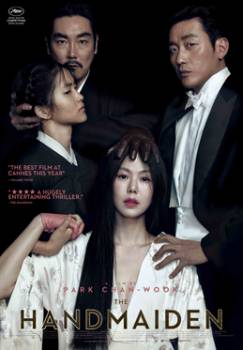
Last edited by Chris Knipp; 10-30-2016 at 07:26 AM.
-
RÉPARER LES VIVANTS/HEAL THE LIVING (Katell Quillévéré 2016)
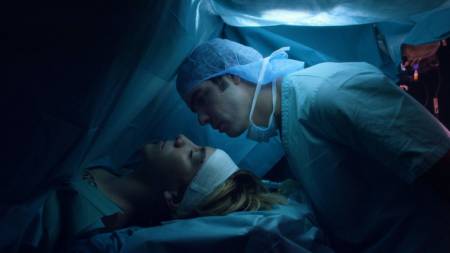
GABIN VERDET AND TAHAR RAHIM IN RÉPARER LES VIVANTS
It all comes together
Katell Quillévéré's third feature adapts Maylis de Kerangal’s bestselling French novel (Heal the Living), a humanistic medical thriller about events leading up to a heart transplant. It begins with Simon (Gabin Verdet), the bleach-blond surfer boy whose car accident makes him brain dead and his perfect organs available for replacing others' failing ones, if his devastated parents, Marianne and Vincent (Emmanuelle Seigner and Kool Shen) are willing. Meanwhile there are closeups of the medical professionals involved, young cardiologist Thomas Rémige (Tahar Rahim) and his master Docteur Pierre Révol (Bouli Lanners) and nurse Jeanne (Monia Chokri). Then we observe Claire (Anne Dorval of Xavier Dolan's Mommy), the lady who is to receive Simon's heart, a lesbian classical pianist and motehr of two college-age sons (Finnegan Oldfield, Théo Cholbi) whose heart's days are numbered.
Like Tell No One, a French version of an American crime story way better than Hollywood could do it, this is a ridiculously vivid, clear, humanistic and tasteful version of what seems the most conventional US TV medical drama material, and you cannot but admire it, while in the back of your mind still wondering, why did she bother? Quillévéré's leap forward as a director of complex, demanding movie dramas - with more budget and more name cast members - is also a step back out of the raw indie territory she inhabited in her first two movies into a safer, more mainstream, even if demanding, work.
But it's still an ambitious, complex film, and not only does she never slip into the saccharine territory that the material threatens to draw her into, but she provides some lovely touches, while the whole fits together impeccably.. The opening passage when Simon leaves his girlfriend Juliette (Galatea Bellugi) in the wee hours, leaping out the window, races a pal, suits up and surfs - water sequence magnificently shot to show both perfect marriage with the waves and threat of death. Then the fatal drive, turned into a sea death as sleepiness of all three youths makes the road and horizon fade into soft waves, the crash just a bang, no messiness. This whole Simon passage, a model of its kind, is of a sublime simplicity and physicality, delivering nothing but a sense of youth, health, and impermanence. The only further development of Simon is equally physical: to seduce Juliette at first meeting, he successfully races her rail car with his bike, leaps over his bike in a move I've never seen, climbs up breathless to the platform, and they kiss.
Later, the film gets equally intimate in a lower key in following Claire as she interacts with her concerned sons Maxime (Oldfield) and Sam (Cholbi) and attends a piano concert by her beautiful protégée and former lover Anne Guérande (actress and pianist Alice Taglioni). She also meets with her cardiologist, who will perform the translpant; Drs. Rémige and Rémol will remove Simon's heart. Claire's scenes require a refocusing effort from the audince after the intensity of the earlier passages, all of them at a high pitch further heightened by Alexandre Desplat's piano-based score. The presence of the well-known French movie composer is a sign of the glossier production, but Thomas Marchand, the editor, whose presence is more essential, was present on the director's first two films. Claire's sequences apparently add to a barely outlined character in the novel, and they're still relatively flat after the vivacity and invention of Simon's sequences and the high pitched emotions of his parents' grieving. A turning point in the film, and a key to its humanism, comes when Marianne and Vincent, still in great grief, come to accept the goodness of allowing their son to be an organ donor.
The still boyish Rahim, who gently elicits this decision, is a good choice for exuding human kindness, and the film's best moment and best evocation of the magic of the medical miracle this story is about comes when he carries out a ritual farewell to Simon in the operating room following the boy's parent's directives, and it's at this moment that this tasteful and economical film indulges in its one repeat sequence, Juliette's tearful face in the light of dawn and Simon's leap out her window: rhythmical repetition, a joining of the circle, death and life.
Still, for all this beauty, though may not miss the oddness of the director's debut Love Like Poison, one does miss a bit the wildness and emotional extremity of her sophomore effort, Suzanne, which also put Adèle Hanel on the map. What Réparer les vivants, heavily publicized in France and widely distributed there, does do, is show that Quillévéré is a directorial talent both recognized and worth continuing to follow.
Réparer les vivants/Heal the LIving, 105 mins., debuted at Venice Sept. 2016, also showing at Toronto and London. French theatrical release bega 1 Nov. 2016. Screened for this review at UGC Danton, Paris, 1 Nov. 2016.
Last edited by Chris Knipp; 02-17-2017 at 03:17 PM.
 Posting Permissions
Posting Permissions
- You may not post new threads
- You may not post replies
- You may not post attachments
- You may not edit your posts
-
Forum Rules






 Reply With Quote
Reply With Quote

















Bookmarks